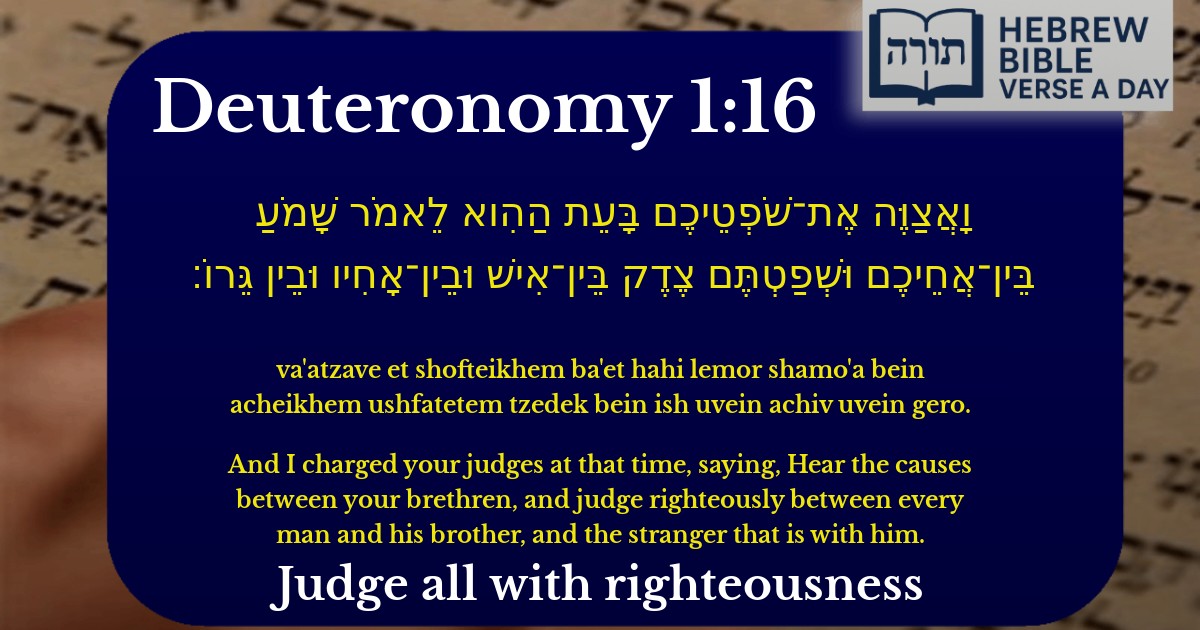Join Our Newsletter To Be Informed When New Videos Are Posted
Join the thousands of fellow Studends who rely on our videos to learn how to read the bible in Hebrew for free!
Hebrew Text
וָאֲצַוֶּה אֶת־שֹׁפְטֵיכֶם בָּעֵת הַהִוא לֵאמֹר שָׁמֹעַ בֵּין־אֲחֵיכֶם וּשְׁפַטְתֶּם צֶדֶק בֵּין־אִישׁ וּבֵין־אָחִיו וּבֵין גֵּרוֹ׃
English Translation
And I charged your judges at that time, saying, Hear the causes between your brethren, and judge righteously between every man and his brother, and the stranger that is with him.
Transliteration
Va'atzave et shofteikhem ba'et hahi lemor shamo'a bein acheikhem ushfatetem tzedek bein ish uvein achiv uvein gero.
Hebrew Leining Text
וָאֲצַוֶּה֙ אֶת־שֹׁ֣פְטֵיכֶ֔ם בָּעֵ֥ת הַהִ֖וא לֵאמֹ֑ר שָׁמֹ֤עַ בֵּין־אֲחֵיכֶם֙ וּשְׁפַטְתֶּ֣ם צֶ֔דֶק בֵּֽין־אִ֥ישׁ וּבֵין־אָחִ֖יו וּבֵ֥ין גֵּרֽוֹ׃
וָאֲצַוֶּה֙ אֶת־שֹׁ֣פְטֵיכֶ֔ם בָּעֵ֥ת הַהִ֖וא לֵאמֹ֑ר שָׁמֹ֤עַ בֵּין־אֲחֵיכֶם֙ וּשְׁפַטְתֶּ֣ם צֶ֔דֶק בֵּֽין־אִ֥ישׁ וּבֵין־אָחִ֖יו וּבֵ֥ין גֵּרֽוֹ׃
🎵 Listen to leining
Parasha Commentary
📚 Talmud Citations
This verse is quoted in the Talmud.
📖 Sanhedrin 7b
The verse is cited in the context of discussing the responsibilities and ethical obligations of judges to adjudicate fairly and impartially, emphasizing the importance of justice for all, including the stranger.


Context of the Verse
This verse appears in Devarim (Deuteronomy) 1:16, where Moshe recounts the establishment of a judicial system in the wilderness. The appointment of judges was initially advised by Yitro (Jethro) in Shemot (Exodus) 18, and here Moshe reiterates the divine command to uphold justice impartially.
Key Themes in the Verse
Commentary from Rashi
Rashi explains that the phrase שָׁמֹעַ בֵּין־אֲחֵיכֶם means judges must patiently hear both sides of a dispute without interruption. He cites the Talmud (Sanhedrin 7b), which states that a judge who hears only one litigant violates this command. Rashi also notes that the repetition of "between a man and his brother, and the stranger" teaches that a ger must be treated with the same dignity as a native-born Jew in court.
Rambam's Perspective
In Hilchot Sanhedrin (Laws of the Sanhedrin 21:1), the Rambam codifies this verse as the foundation for judicial ethics. He writes that judges must avoid any appearance of bias, whether due to kinship, wealth, or social status. The Rambam further emphasizes that the ger is included to prevent judges from assuming a convert might be less truthful or deserving of justice.
Midrashic Insight
The Sifrei (Devarim 16) expands on the phrase וּשְׁפַטְתֶּם צֶדֶק ("judge righteously"), teaching that judges must seek absolute truth, not merely procedural fairness. The Midrash compares this to the scales of the Mishkan, which had to be perfectly balanced—symbolizing that justice must be equally precise.
Practical Halachic Implications
This verse informs several halachic principles: